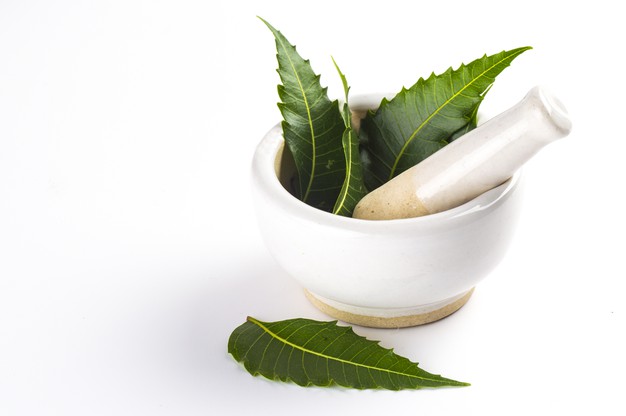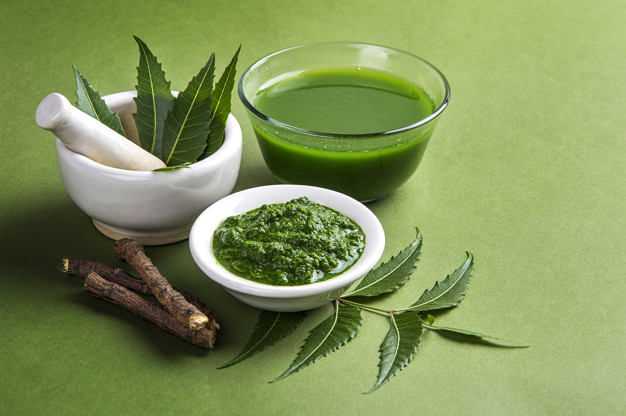Neem is an important tree belongs to the genus Azadirachta and Meliaceae family. It is generally grown in tropical as well as subtropical region and it is native to India. The bark, flowers, seeds and leaves of neem have profound health benefits and they are widely used for preparing various medicines, cosmetic products and therapeutic supplements.
Nutritional profile
- It contains lesser amount of carbohydrate
- It contains adequate amount of dietary fibre
- It also contains too some extent of protein and it is significantly rich in some amino acids, which include alanine, glutamic acid, tyrosine, aspartic acid and cystine
- It contains negligible amount of fat thus it is considered as a poor source of fat
- It is totally free from cholesterol
- It is packed with various important micronutrients, such as vitamin A, Vitamin C, calcium, phosphorus, potassium, iron and magnesium
- It contains several imperative biological active compounds that help to make neem relatively healthier. These compounds include flavonoids, coumarins, terpenoids, tannins, alkaloids and sulphurous compounds

Biological property
Antioxidant activity
- Nimbolide and quercetin are the two most important substances found in neem, are responsible for exhibiting antioxidant activities
- It plays significant role in reducing the concentration of free radicals within body hence helps to protect the body from their harmful effects
- It also helps to decrease oxidative stress
- Its consumption is very effective for decreasing the susceptibility of developing chronic diseases

Detoxifying activity
- Neem leaves are well known for their cleansing property
- It plays significant role in stimulating the elimination of toxins from body
- It is better to consume neem leaf juice for reducing the concentration of toxins within blood
Anti-microbial activity
- It exerts strong antimicrobial activities, which are associated with preventing the growth and reproduction of microbes within host thus its consumption is most significant for lessening the risk of developing infectious diseases
- It is very effective for destroying bacteria and reduces the prevalence of bacterial infestation and its harmful consequences
- It is also extremely helpful for suppressing the growth of fungus even it is related with destroying them completely
Health benefits of Neem leaves
Role on immunity
- Its antimicrobial, antioxidant and micronutrients contents are responsible for strengthening the immune system of body
- It helps to improve the diseases fighting capacity of body thus helps to reduce the susceptibility developing diseases (communicable as well as non communicable)

Role on skeletal system
- It contains significant amount of calcium, which plays vital role in the growth and development of skeletal system
- It promotes the synthesis of healthy bone tissues
- It also helps to improve bone mineral density that is related with enhancing bone mass
- It plays imperative role in strengthening the bone and reduces the susceptibility of developing bone disorders
- It has seen that application of neem oil on joints significantly reduces joint inflammation and also helps to reduce arthritic pain
Role on oral health
- Consumption of neem leaves are very beneficial for maintaining a good oral hygiene
- It plays imperative role in preventing microbial infestation within oral cavity and its antimicrobial property is accountable for destroying those microbes, which are responsible for developing oral infections
- It is associated with maintaining the normal alkalinity of saliva, which helps to kill germs and provides a fresh breath
- Consumption of neem leaf extract is very affective for preventing the prevalence of dental carries
- It also helps to prevent dental plaque formation
- It helps to prevent gum infections as well

Role on digestive health

- It plays significant role in promoting digestion
- It also helps to improve liver function
- It helps to prevent fatty infiltration of liver that ultimately reduces the risk of developing hepatic disorders
- It is also associated with destroying harmful microbes of intestine that helps to make the intestine (especially the colon) clean
- It helps to protect the gastrointestinal tract from oxidative and inflammatory damages hence reduces the prevalence of various gastrointestinal disorders like irritable bowel syndrome, diverticular disease, inflammatory bowel disease, constipation, ulcerative colitis etc
Role on eye health
- It has been traditionally used in ayurveda for promoting eye health
- It has seen that consumption of neem leaves significantly improves vision
- Wash eyes with neem water (water should be added with some neem leaves and should be boiled for few minutes followed by cooling) is very effective for preventing eye irritation or redness
Role on skin
- It helps to purify blood by eliminating toxins, which eventually provides a clearer skin
- Its antimicrobial activities are responsible for reducing the prevalence of any kind of skin infections
- Its antioxidant activities are accountable for protecting the skin from oxidative damages and prevents ageing
- It has seen that consumption of neem extract raw or with honey (for avoiding its bitterness) significantly reduces the consequences of insect bites, ring worms, eczema and itching
- It also helps to prevent dark spot problems and acne

Role on hair
- Neem leaves are very helpful for promoting hair growth
- Its antioxidant activities are responsible for protecting the scalp from oxidative damages and reduces hair falls
- It helps to stimulate the growth of hair follicle
- It also helps to strengthen the hair
- Its antifungal property is accountable for destroying fungi named Malassezia, which develops dandruff. It is better to wash hair with boiled neem water for combating dandruff as well as damaged and undernourished hair
Other health benefits
- It is a good source of iron hence its consumption is very effective for improving the synthesis of hemoglobin and also decreases the risk of developing iron deficiency anemia
- It also has hypoglycemic effects, which helps to reduce the concentration of free glucose within blood
- It plays significant role in treating leprosy
- It helps to improve the symptoms of bloody nose
- Its consumption is also very useful for preventing the risk of developing cardio vascular diseases
Effects of neem flower on human health
- Neem flower is white in colour
- It has a sweet jasmine like odour
- It has numerous therapeutic advantages. It is extensively used for reducing the prevalence of anorexia, nausea, vomiting and headache
- It also helps to provide a calmness to body hence it is widely used in aroma therapy

Effects of neem twig and bark on human health
- It has profound oral and dental benefits. It has seen that several people has extensively used neem twigs for brushing their teeth for obtaining a better oral health
- It has been traditionally used for preventing the growth of microbes within oral cavity that helps to decrease the prevalence of mouth and gum infections
Effects of neem oil on human health
- The oil extracted from neem seed is known as neem oil and it is very popular for its numerous medicinal properties
- It plays significant role in nourishing hair and skin
- It is extensively used for preparing several cosmetic products like creams, shampoo, soaps etc
So, consumption of neem is a healthy choice as it helps to improve the well being. It is also related with decreasing the susceptibility of developing chronic diseases and does not expose too much toxicity.

Source:
Giri, R.P., Gangawane, A.K. and Giri, S.G., 2019. Neem the Wonder Herb: A Short Review.
Islas, J.F., Acosta, E., Zuca, G., Delgado-Gallegos, J.L., Moreno-Treviño, M.G., Escalante, B. and Moreno-Cuevas, J.E., 2020. An overview of Neem (Azadirachta indica) and its potential impact on health. Journal of Functional Foods, 74, p.104171.
Pandey, A. and Pare, P., 2018. A review: Antimicrobial activity of Azadirachta indica (Neem). International Journal of Pharmacy & Life Sciences, 9(3).
Rahmani, A., Almatroudi, A., Alrumaihi, F. and Khan, A., 2018. Pharmacological and therapeutic potential of neem (Azadirachta indica). Pharmacognosy Reviews, 12(24).
Ravishankar, T.L., Kaur, R., Kaur, S. and Bhattacharyya, S., Neem (Azadirachta indica): An Elixir in Dentistry.
Sanadi, R., Kadri, K., Sawarkar, M. and Pathak, T., Applications of neem in periodontal therapy: A narrative review.
Tanguturi, S.C., Gunupati, S. and Nagarakanti, S., 2020. Azadirachta indica (Neem) An Ancient Indian Boon to the Contemporary World of Dentistry. Natural Oral Care in Dental Therapy, pp.313-328.



